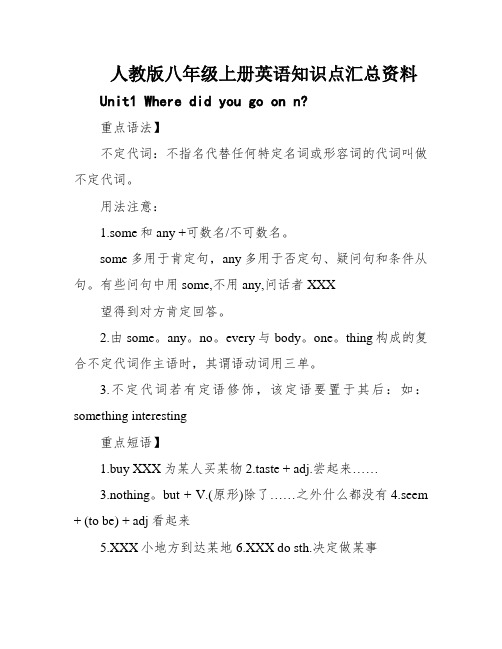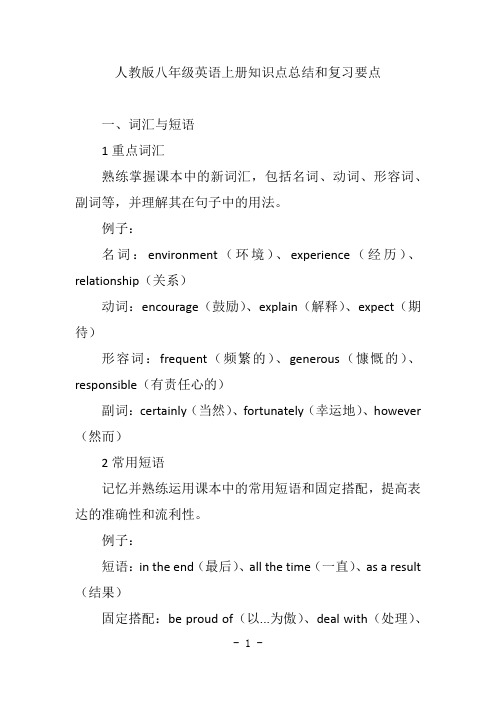人教版八年级上册英语知识点归纳
人教版英语八年级上册知识点、语法和作文总结

八年级上册英语知识点Unit1 Where did you go on vacation?一、短语stay at home 待在家里 go on vacation 去度假 go to the mountains 去爬山 go to the beach 去海滩 visit museums 参观博物馆 quite a few 相当多 go to summer camp 去参观夏令营study for 为……而学习 go out 出去 most of the time 大部分时间taste good 尝起来很好吃 of course 当然 have a good time 玩得高兴go shopping 去购物 feel like 给…的感觉;感受到 in the past 在过去walk aroundone bowl of… a bag of apples drink tea 喝茶 take photos 二、习惯用法 taste + adj. nothing…but+arrive in+大地点 / arrive at+小地点到达某地decide to do sth. 决定去做某事 try doing sth.尝试做某事 try to do sth.尽力去做某事forget doing sth.忘记做过某事/ forget to do sth.忘记做某事 enjoy doing sth.喜欢做某事want to do sth.想去做某事 start doing sth.开始做某事 stop doing sth. 停止做某事dislike doing sth. 不喜欢做某事 keep doing sth.继续做某事 Why not do sth.? 为什么不做……呢?so+adj.+that+从句如此……以至于…… tell sb. (not) to do sth. 告诉某人(不要)做某事三、词语辨析:1. anywhere 与 somewhere 两者都是不定副词。
人教版八年级上册英语知识点汇总资料

人教版八年级上册英语知识点汇总资料Unit1 Where did you go on n?重点语法】不定代词:不指名代替任何特定名词或形容词的代词叫做不定代词。
用法注意:1.some和any +可数名/不可数名。
some多用于肯定句,any多用于否定句、疑问句和条件从句。
有些问句中用some,不用any,问话者XXX望得到对方肯定回答。
2.由some。
any。
no。
every与body。
one。
thing构成的复合不定代词作主语时,其谓语动词用三单。
3.不定代词若有定语修饰,该定语要置于其后:如:something interesting重点短语】1.buy XXX为某人买某物2.taste + adj.尝起来……3.nothing。
but + V.(原形)除了……之外什么都没有4.seem + (to be) + adj看起来5.XXX小地方到达某地6.XXX do sth.决定做某事7.XXX.尝试做某事/ try to do sth.尽力做某事8.XXX喜欢做某事9.want to do sth.想去做某事10.start XXX开始做某事=XXX.11.XXX停止做某事区分。
to do sth.停下来去做某事12.XXX XXX.不喜爱做某事14.so + adj + that +从句云云……以至于……16.tell sb。
(not) to do sth.告诉或人(不要)做某事17.keep XXX.连续做某事18.XXX.遗忘去做某事XXX遗忘做过某事词语辨析】1.XXX照相quite a few+名词复数“许多…”2.XXX形容词看起来…。
You seem happy today.XXX.好像XXX仿佛做某事I seem to have a coldIt seems +从句似乎。
….It XXX.seem like。
好像,似乎…。
It seems like a good idea.XXX小地点注:若后跟地点副词XXX,介词需省略,如:arrive here。
人教版八年级上册英语知识点归纳

⼈教版⼋年级上册英语知识点归纳⼋年级英语上册知识点总结Unit 1: How often do you exercise?【复习⽬标】会使⽤频率副词及短语;能描述课余时间的活动安排;会描述基本饮⾷结构。
【语⾔⽬标】● What do you usually do on weekends? I sometimes go to the beach.● How often do you eat vegetables? Every day● Most students do homework every day.【重点词汇】●always, usually , often, sometimes , hardly , ever, never.●how often, once , twice , three times a week , every day.【应掌握的词组】1. go to the movies 去看电影2. look after = take care of 照顾3. surf the internet 上⽹4. healthy lifestyle 健康的⽣活⽅式5. go skate boarding 去滑板6. keep healthy=stay healthy 保持健康7. exercise=take(much)exercise=do sports 锻炼8. eating habits 饮⾷习惯9. take more exercise 做更多的运动10. the same as与什么相同11. be different from 不同12. once a month ⼀⽉⼀次13. twice a week ⼀周两次14. make a difference to 对什么有影响15. how often 多久⼀次16. although = though 虽然17. most of the students=most students18. shop=go shopping=do some shopping 购物19. as for ⾄于20. activity survey 活动调查21. do homework 做家庭作业22. do housework 做家务事23. eat less meat吃更少的⾁24. junk food 垃圾⾷物25. be good for 对什么有益26. be bad for 对什么有害27. want to do sth 想做某事28. want sb to do sth 想某⼈做某事29. try to do sth 尽量做某事30. come home from school 放学回家31. of course = certainly = sure 当然32. get good grades 取得好成绩33. some advice34. hardly=not nearly / almost not ⼏乎不35. keep/be in good health 保持健康36. b e stressed out 紧张的,有压⼒的37. take a vacation 去度假48. g et back 回来【应掌握的句⼦】1. How often do you exercise? 你(你们)多久锻炼⼀次⾝体?How often + 助动词do(does 或did) + 主语+ do sth.? 疑问词how often 是问频率(多久⼀次),(在这⾥助动词do(does 或did) 是起帮助构成疑问的作⽤)与⼀般现在时或⼀般过去时连⽤,回答⼀般是⽤表⽰频率的副词,如:once, twice, three times , sometimes, often, quite, often, never, every day, once a week , twice a month , three times a month , three or four times a month 等。
人教版八年级上册英语语法、短语和知识点总结归纳

人教版八年级上册英语语法、短语和知识点总结归纳一、语法1. 一般现在时- 用法:表示经常性或惯性的动作或状态。
- 结构:主语 + 动词原形 (+ 其他成分)- 示例:I play soccer every weekend.2. 一般过去时- 用法:表示过去某个时间点或一段时间内发生的动作或存在的状态。
- 结构:主语 + 动词过去式 (+ 其他成分)- 示例:She watched a movie last night.3. 现在进行时- 用法:表示现在正在发生的动作。
- 结构:主语 + am/is/are + 动词-ing (+ 其他成分)- 示例:They are studying for the exam.4. 现在完成时- 用法:表示动作或状态发生在过去某个时间点,但与现在有关。
- 结构:主语 + have/has + 动词过去分词 (+ 其他成分)- 示例:I have finished my homework.5. 情态动词- 用法:表示能力、意愿、可能性等。
- 常见的情态动词有 can, could, may, might, must, should, ought to 等。
- 示例:He should go to bed early.二、短语1. as well as- 用法:表示两个事物同时存在或发生。
- 示例:She can speak English as well as Chinese.2. in order to- 用法:为了做某事。
- 示例:They woke up early in order to catch the train.3. by the way- 用法:用于引入一个新的话题或问题。
- 示例:By the way, have you seen the latest movie?三、知识点1. 直接引语和间接引语- 直接引语:用引号括起来的原话。
- 间接引语:将直接引语转述为陈述句或疑问句。
人教版八年级英语上册知识点总结

人教版八年级英语上册知识点总结一、基本语法1.时态:英语时态分为以下几种:现在时、过去时、将来时。
每种时态又分为简单时态、进行时态、完成时态和完成进行时态等。
例如:–现在时:简单现在时: 主语 + 动词原形;进行现在时:主语 + be(am/is/are) + v-ing;完成现在时:主语 + have / has + 过去分词;完成进行现在时:主语 + have / has + been + v-ing。
–过去时:简单过去时:主语 + 动词过去式;进行过去时:主语 + was / were + v-ing;完成过去时:主语 + had + 过去分词;完成进行过去时:主语 + had + been + v-ing。
–将来时:简单将来时:主语 + will / shall + 动词原形;进行将来时:主语 + will / shall + be + v-ing;完成将来时:主语 + will / shall + have + 过去分词;完成进行将来时:主语 + will / shall + have + been + v-ing。
2.倒装句:倒装是指把谓语动词放在主语前面形成的一种语法现象。
如:Only in this way can we solve the problem. (只有这样才能解决问题。
) 倒装句句型格式为:_____+主语(名词或代词)+_____。
在不同的情况下需要用到不同的“辅助动词/助动词”来进行倒装。
3.被动语态:被动语态就是在句子中表达动作的承受者(即主语)的语态。
结构为:被(或受)动责任的动词(to be) + 过去分词。
如:The book was written by him.(这本书是由他写的。
)4.虚拟语气:虚拟语气是指在表示假设,愿望,建议等语气时所使用的一种语态形式。
其结构为:主语+should/could/might/would+(have)+动词原形。
如: If I were you, I would buy this dress(如果我是你,我会买这件衣服。
人教版八年级英语上册知识点总结和复习要点

人教版八年级英语上册知识点总结和复习要点一、词汇与短语1重点词汇熟练掌握课本中的新词汇,包括名词、动词、形容词、副词等,并理解其在句子中的用法。
例子:名词:environment(环境)、experience(经历)、relationship(关系)动词:encourage(鼓励)、explain(解释)、expect(期待)形容词:frequent(频繁的)、generous(慷慨的)、responsible(有责任心的)副词:certainly(当然)、fortunately(幸运地)、however (然而)2常用短语记忆并熟练运用课本中的常用短语和固定搭配,提高表达的准确性和流利性。
例子:短语:in the end(最后)、all the time(一直)、as a result (结果)固定搭配:be proud of(以...为傲)、deal with(处理)、pay attention to(注意)二、句型与语法1基本句型熟练掌握五种基本句型,包括主语+谓语、主语+谓语+宾语、主语+谓语+间接宾语+直接宾语、主语+谓语+宾语+宾语补足语、主语+系动词+表语。
例子:主语+谓语:She sings.(她唱歌。
)主语+谓语+宾语:I like apples.(我喜欢苹果。
)主语+谓语+间接宾语+直接宾语:He gave me a book.(他给了我一本书。
)主语+谓语+宾语+宾语补足语:I found the book interesting.(我发现这本书很有趣。
)主语+系动词+表语:She is beautiful.(她很漂亮。
)2时态深入学习并掌握现在完成时、过去进行时、一般将来时、过去将来时等时态的用法和形式。
例子:现在完成时:I have already seen that movie.(我已经看过那部电影了。
)过去进行时:They were playing football when I called them.(我打电话给他们时,他们正在踢足球。
(完整版)人教版八年级英语上册各单元知识点归纳和作文范文
新课标八年级上册英语单元知识点归纳Unit1 Where did you go on vacation?短语归纳1.go on vacation去度假2.stay at home待在家里3.go to the mountains去爬山4.go to the beach去海滩5.visit museums 参观博物馆6.go to summer camp去参加夏令营7.quite a few相当多8.study for tests为测验而学习9.go out出去10.most of the time大部分时间11.have a good time doing=have fun doing =enjoy oneself玩得高兴12.of course=sure =certainly当然13.feel like给……的感觉;感受到14.go shopping去购物15.in the past在过去16.walk around四处走走17.because of+名词短语:因为because+句子18. a/one bowl of…一碗……19. the next day第二天20.drink tea喝茶21.find out找出;查明22.go on继续23.take photos照相24.something important重要的事25.up and down上上下下e up出来come out 出版发行27.go out with anyone 跟别人出去28.say about 发表对…看法29.rain hard 雨下得大30.too much+不可数名词太多too many+可数名词复数太多much too+形容词太用法:1.buy sth. for sb. / buy sb. sth.为某人买某物2.taste / look/sound/smell good. 尝起来/看起来/听起来/闻起来不错3.nothing…but+动词原形除了……之外什么都没有4.seem+(to be)+ adj. 看起来……5.arrive in+大地点/ arrive at+小地点/get to +地点/reach +地点到达某地6.decide to do sth.决定去做某事7.try doing sth.尝试做某事/ try to do sth.尽力去做某事8.forget doing sth.忘记做过某事/ forget to do sth.忘记做某事9.enjoy doing sth.喜欢做某事10. want to do sth.想去做某事11.start doing sth.开始做某事12.stop doing sth. 停止做某事13.dislike doing sth. 不喜欢做某事14.keep doing sth.继续做某事keep on doing sth 不停做某事15.Why not do. sth.=why don’t you do sth为什么不做……呢?16.so+adj.+that+从句如此……以至于……17.tell sb. (not) to do sth. 告诉某人(不要)做某事18.enough +名词,形容词+enough19.not really .真的没有。
人教版八年级英语上册知识点总结
人教版八年级英语上册知识点总结人教版八年级英语上册知识点句子成分和类型1.主语:句子所陈述的对象。
2.谓语:主语发出的动作。
一般是有动作意义的动词。
3.宾语:分为动词宾语和介词宾语,属于动作的承受者。
4.系动词:表示状态或状态变化的动词,没有实际的动作意义。
如 be,感官系动词(look, sound, smell, taste 和 feel)、保持类系动词(keep,stay 和 remain)、状态变化类系动词(become、get、turn 和 go)等。
5.表语:紧跟系动词后面的成分。
6.定语:修饰名词或代词的成分。
7.状语:修饰形容词、副词、动词或句子的成分。
8.补语:分为宾语补足语和主语补足语。
是对宾语和主语的补充说明,与其有主动或被动的逻辑关系。
例如:You should keep the room clean and tidy.你应该让屋子保持干净整洁。
(You是主语, should keep是谓语,the room是宾语,clean and tidy是宾语补足语。
)This kind of food tastes delicious.这种食物吃起来很可口。
(This kind of food是主语, tastes是系动词, delicious是表语。
)注意:主语、谓语、宾语、系动词、表语、补语是一个句子的主干成分;定语和状语是一个句子的修饰性成分,不是主干成分。
9.简单句的基本形式是由一个主语加一个谓语构成。
10.复合句由一个主句和一个或一个以上的从句构成。
11.两个或两个以上的简单句用并列连词连在一起构成的句子,叫做并列句,其基本结构是“简单句+并列连词+简单句”。
一般疑问句一、不用疑问词,但需要用yes或no回答的疑问句,叫一般疑问句。
句末用问号“?”。
一般疑问句的基本用法及结构一般疑问句用于对某一情况提出疑问,通常可用yes和no来回答,读时用升调。
其基本结构是“be / have / 助动词+主语+谓语(表语)”:Is he interested in going? 他有兴趣去吗?Have you ever been to Japan? 你到过日本吗?Does she often have colds? 她常常感冒吗?Did you ask her which to buy? 你问没问她该买哪一个?二、陈述句变一般疑问句的方法1.动词be的疑问式:动词be根据不同的时态和人称可以有am, is, are,was, were等不同形式,可用作连系动词(表示“是”、“在”等)和助动词(用于构成进行时态和被动语态等),但不管何种情况,构成疑问式时,一律将动词be的适当形式置于句首:句型:Be动词+主语~?Is your father angry?你父亲生气了吗?Yes,he is.是的,他生气了。
人教版八年级英语上册知识点总结(全)
人教版八年级英语上册知识点总结(全)Unit 1 How often do you exercise?一、词汇精讲1、 always、usually、often、sometimes、hardly ever和neveralways、usually、often、sometimes、hardly ever和never是英语中最常见的频度副词。
(1)always的频度为100%;表示动作重复、状态继续;中间没有间断;意思是“总是”、“永远地”。
The sun always rises in the east and sets in the west. 太阳总是东升西落。
(2)usually 的频度为70%左右;意为“通常”、“平常”;即很少有例外。
He usually goes to bed at ten o’clock. 他通常10点钟睡觉。
(3)often的频度为50%左右;意为“常常”;但不如usually那么频繁;表示动作重复;中间有间断。
He is often late for school. 他上学经常迟到。
(4)sometimes的频度为20%左右;意为“有时”;表示动作偶尔发生。
可以位于句首;以示强调。
多用于一般现在时。
It is sometimes hot and sometimes cold. 天气忽冷忽热。
Sometimes he does it this way and sometimes he does it that way.他有时这样做;有时那样做。
(5)hardly ever 的频度为5%左右;意为“几乎不”、“偶尔”;表频率;位置是“行前be后”。
I hardly ever go out these days. 这些天我几乎不出门。
(6)never 的频度为0;意为“从来不”、“永不”。
My parents are never late for work. 我父母上班从来不迟到。
人教版八年级上册英语知识点汇总
人教版八年级上册英语知识点汇总234钱”。
人(sb.) spend 时间/钱(in) doing“花费多少时间来做某事”。
pay 的主语必须是人,而“花钱买某物”为pay...for...10. however 副词,意为“然而,可是”,表示转折关系,可放在句首、句中、句末。
Unit3 I’m more outgoing than my sister.重点语法】1. 形容词和副词的比较等级(1)形容词和副词的原形就是原级(2)比较级,表示较……或更……(3)最高级,表示最...。
2. 比较级句型:(1)A + be动词+形容词的比较级+than +B “A比B更……”(注意:A与B必须是同级的,即必须是人与人,物与物进行对比)(2)“A+实意动词+副词比较级+ than + B”表示“A 比B…”(3)比较A ,B两人/两事物问其中哪一个较…...时用句型:“Who/which +谓语动词+ adj./adv.比较级,A or B ?”Who is thinner, Jenny or Mary?3. 比较级的特殊用法(1)“比较级+and+比较级”,意为“越来越”。
多音节比较级用“more and more+原级”(2)“the+比较级(…), the+比较级(…)”意思是:”越…越…”The more, the better.(3)主+ is + the 形容词比较级+of the two+名复“主语是两者中较......的”4. 两者在某一方面相同:A+谓语动词/be动词+as+ adj./adv.原级+ as+ B.Helen is as tall as Amy.Peter studies as hard as Tom.表示两者在某一方面不及另一方时,用“not as/so+形容词或副词原级+as”I am not as tall as my sister.5. 形容词,副词比较级前的修饰语。
- 1、下载文档前请自行甄别文档内容的完整性,平台不提供额外的编辑、内容补充、找答案等附加服务。
- 2、"仅部分预览"的文档,不可在线预览部分如存在完整性等问题,可反馈申请退款(可完整预览的文档不适用该条件!)。
- 3、如文档侵犯您的权益,请联系客服反馈,我们会尽快为您处理(人工客服工作时间:9:00-18:30)。
八年级英语上册知识点总结Unit 2: How often do you exercise?【复习目标】会使用频率副词及短语;能描述课余时间的活动安排;会描述基本饮食结构。
【语言目标】● What do you usually do on weekends?I sometimes go to the beach.● How often do you eat vegetables? Every day● Most students do homework every day.【重点词汇】●always, usually , often, sometimes , hardly , ever, never.●how often, once , twice , three times a week , every day.【应掌握的词组】1. go to the movies 去看电影2. look after = take care of 照顾3. surf the internet 上网4. healthy lifestyle 健康的生活方式5. go skate boarding 去滑板6. keep healthy=stay healthy 保持健康7. exercise=take(much)exercise=do sports锻炼8. eating habits 饮食习惯9. take more exercise 做更多的运动10. the same as 与什么相同11. be different from 不同12. once a month一月一次13. twice a week一周两次14. make a difference to 对什么有影响15. how often 多久一次16. although = though虽然17. most of the students=most students18. shop=go shopping=do some shopping 购物19. as for至于20. activity survey活动调查21. do homework做家庭作业22. do housework做家务事23. eat less meat吃更少的肉24. junk food垃圾食物25. be good for 对什么有益26. be bad for对什么有害27. want to do sth 想做某事28. want sb to do sth想某人做某事29. try to do sth 尽量做某事30. come home from school放学回家31. of course = certainly = sure当然32. get good grades取得好成绩33. some advice34. hardly=not nearly / almost not几乎不35. keep/be in good health保持健康36.be stressed out紧张的,有压力的37. take a vacation 去度假48.get back 回来【应掌握的句子】1. How often do you exercise? 你(你们)多久锻炼一次身体?How often + 助动词do(does或did) + 主语 + do sth.? 疑问词how often是问频率(多久一次),(在这里助动词do(does或did) 是起帮助构成疑问的作用)与一般现在时或一般过去时连用,回答一般是用表示频率的副词,如:once, twice, three times…, sometimes, often, quite, often, never, every day, once a week , twice a month , three times a month , three or four times a month 等。
翻译:“你们多久到工厂去一次?”“每星期两次。
”“How often do you go to the factory?” “Twice a week. ”“他们多长时间举办一次舞会?”“通常每两周举办一次。
”“How often do they have a dancing party?” “Usually, once every other week.”“他多久去购一次物?”“一个月一次。
”“How often does he go shopping?” “He goes shopping once a month.”2. “What do you usually do on weekends?” “ I usually play soccer.”“周末你通常做什么?”“我通常踢足球。
”第一个do为助动词, 在这起帮助构成疑问的作用;而第二个do则是实义动词。
翻译:What do you usually do on weekends? I often go to the movies.What does she usually do on weekends? She sometimes go hiking.3. “What’s your favorite program?” “It’s Animal World.”=What program do you like best?“你最喜欢什么节目?”“动物世界。
”4. As for homework , most students do homework every day .as for...意思是“至于;关于”,常用于句首作状语,其后跟名词、代词或动词的-ing形式(即动名词)。
如: As for him,I never want to see him here. 至于他,我永远不希望在这里见到。
As for the story,you'd better not believe it. 关于那故事,你最好不要相信。
翻译:至于我自己,我现在不想去。
(As for myself, I don’t want to go now. )至于那个人,我什么都不知道。
(As for the man, I know nothing about him.)5. Mom wants me to get up at 6:00 and play ping-pong with her .want to do sth. 意思是“想要做某事”;want sb. to do sth.意思是“想要某人做某事”。
如:Do you want to go to the movies with me?你想和我一起去看电影吗?The teacher doesn't want us to eat hamburgers.老师不想让我们吃汉堡包。
6. She says it’s good f or my health.be good for...表示“对……有益(有好处)”;其反义为:be bad for...。
(这里for 是介词,后跟名词、代词或动名词)如:It's good for us to do more reading. 多读书对我们有好处。
Reading in bed is bad for your eyes.在床上读书对你的眼睛有害。
7. How many hours do you sleep every night?8. I exercise every day , usually when I come home from school .9. My eating habits are pretty good .这里pretty相当于very 。
10. I try to eat a lot of vegetables , usually ten to eleven times a week .try to do sth.表示“尽力做某事”,不包含是否成功的意思而try doing sth.表示“(用某一办法)试着去做某事”。
如: You’d bett er try doing the experiment in another way.你最好试试用另一种方法做这个试验。
11. My healthy lifestyle helps me get good grades.help sb.(to) do sth.帮助某人做某事12. Good food and exercise help me to study better.这里better是well的比较级,而不是good的比较级13. Is her lifestyle the same as yours or different?=Is her lifestyle the same as your lifestyle or is her lifestyle different from yours? be the same as … / be different from …14. What sports do you play ?15. A lot of vegetables help you to keep in good health .keep in good health = keep healthy = stay healthy16. You must try to eat less meat .try to do sth.表示“尽力做某事” ,不包含是否成功的意思,less是little的比较级17. That sounds interesting.这是“主语+系动词+表语”结构的简单句。
sound(听起来),look(看起来),smell(闻起来),taste (尝起来),feel(觉得),seem(好象),grow(变得),get(变得)等词在英语中可用作系动词,后跟形容词作表语。
如:It tastes good. 这味道好。
The music sounds very sweet. 这音乐听起来很入耳。
The smoke grew heavier and heavier. 烟雾变得越来越浓了。
【词语辨析】一、maybe / may be1. The baby is crying she is hungry.2. The woman a teacher .maybe 是副词,意为“大概,可能,或许”,一般用于句首。
May be是情态动词,意为“可能是..,也许是..,大概是..”.二、a few / few / a little / little三、none / no onenone指人或物,强调数量,用how many提问,常与of连用。
